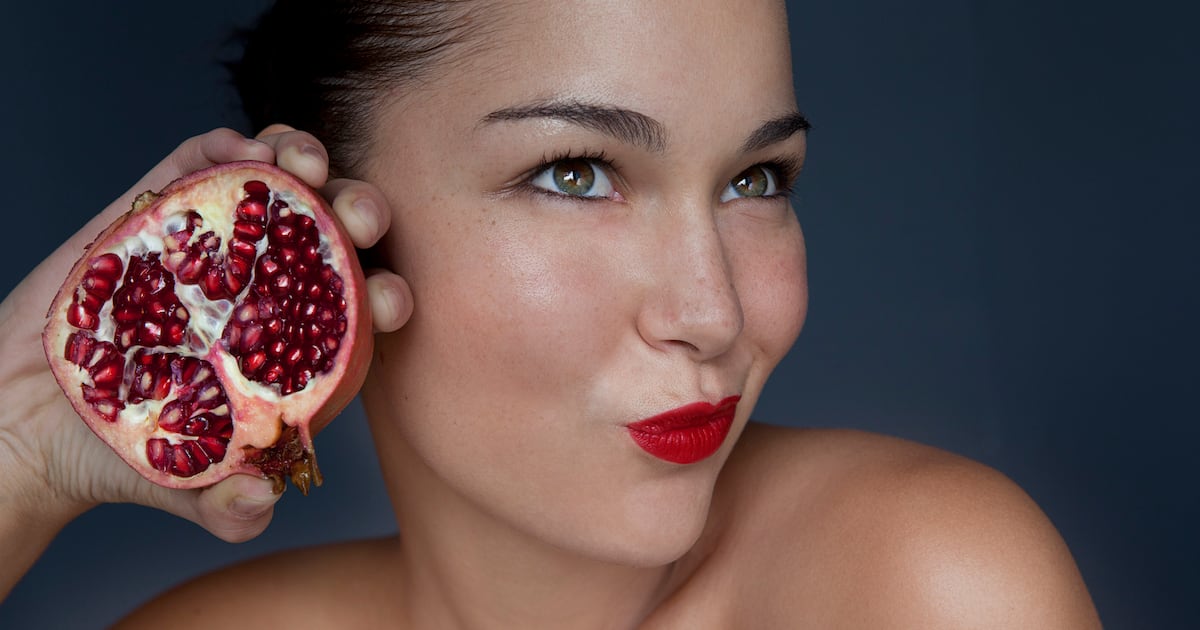Since ancient times, the pomegranate tree has been viewed as a symbol of life, fertility and strength. While in more recent years, the pomegranate has been dubbed a ‘superfood’ thanks to its high levels of vitamins and polyphenol antioxidant ellagic acid from ellagitannins.
Newer research has shown that the ellagitannins are transformed by gut bacteria into the metabolite compound Urolithin A, which has been shown to decrease inflammation and has also been said to increase lifespan and healthspan in animal-based models.
For example, a study undertaken by US-based scientists in 2019 that was published in the International Journal for Vitamin and Nutrition Research found that pomegranate could extend the lifespan and reduce intestinal fat for Caenorhabditis elegans.
While there has been plenty of research in the food and nutrition space showing the health and wellness benefits of pomegranates, the fruit also becoming a star in the beauty industry and being used in both topical and ingestible formulations.
Topical pomegranate oil: antioxidant and anti-ageing benefits
One beauty brand that has formulated with pomegranate for its topical benefits is the Swiss beauty and naturopathic brand Weleda. In April 2024, Weleda released its Pomegranate and Maca Peptides Firming Facial Care range, which is made with cold-pressed pomegranate oil.
According to the brand, it is an “ideal component for skin care from the age of 40.” It said that pomegranate seeds have an average oil content of between 12 and 20% and contain punicic acid, a polyunsaturated fatty acid that belongs to the omega-5 group of fatty acids.
Weleda also noted that pomegranate oil has an antioxidant effect, promotes cell renewal and skin regeneration, nourishes ageing, stressed and dry skin, and also has a “potent antioxidant effect and can help to break down free radicals.”
Exosome innovation: Naolys’ pomegranate-based skin care
In April 2025, French biotech firm Naolys launched its new ExoCell range, a collection of customisable exosomes, which are the result of two years of its applied research programme with the University of Bordeaux.
One of these, Aethelis Granata, uses the “biological power of pure exosomes extracted from pomegranate plant cells,” according to the company, and “influences a key post-translational modification process that is linked to epigenetic regulation.”
Through this pathway, Naolys said it has been “proven to trigger a cascade of cellular responses” and that “it supports chromatin organisation, enhances DNA repair mechanisms, stimulates mitochondrial energy production, and reinforces intercellular communication, ultimately contributing to a visibly healthier, more resilient skin.”
Anne-Laure Larrivière, who is director of marketing and communications at Naolys, explained that the company chose to work with pomegranate because it’s one of the most fascinating plants when it comes to longevity and resilience.
“We’ve gone one step further with Aethelis Granata ExoCell, by sustainably extracting exosomes from pomegranate plant cells,” she shared. “These exosomes help the skin reactivate its own cellular language. They stimulate key mechanisms involved in longevity.”
Larrivière continued to say that in the firm’s own research it found out that “pomegranate exosomes can particularly stimulate SUMOylation, which in turn helps repair DNA, boosts mitochondrial activity and improves intercellular communication.”
She said the results were confirmed by a clinical study that Naoyls undertook that showed “visibly healthier, more hydrated, more resilient skin.”
According to Larrivière, Naolys now views pomegranate as “much more than a trendy fruit.” Instead it is “a timeless botanical ally, combining tradition, science and performance.”
Urolithin A and mitophagy: targeting cellular longevity
In January 2024, French multinational beauty company L’Oréal invested in a startup Timeline, which in collaboration with the Swiss Federal Institute of Technology de Lausanne (EPFL), created Mitopure-branded urolithin A—a postbiotic targeting mitochondrial health and longevity.
According to Timeline, it is the first postbiotic nutrient “shown to trigger a crucial recycling process within our cells called ‘mitophagy’—targeting age-related cellular decline.”
Mitochondria provides a lot of energy for skin to fight against ageing, but with time, dysfunctional mitochondria lead to reduced energy production, cellular decline and skin signs of aging like sagginess, dullness, wrinkles and weakened skin barrier.
The company explained that mitophagy acts as a recycling and cleansing mechanism for defective mitochondria, allowing them to repair themselves and improve their performance to provide valuable health benefits.
Julie Faitg, senior manager of applied research and regulatory affairs at Timeline, described ‘mitophagy’ as “a Pac Man that eats the dysfunctional mitochondria but with age doesn’t work as well anymore” and said that Timeline started studying this subject 15 years ago, investigating pomegranate ellagitannins, a precursor to urolithin A.
Studies have shown that the best way to get more urolithin A is by eating foods rich in ellagitannins that support production the body’s own urolithin A production in the gut.
“If you have the right gut microbiome you can process more of it,” said Faitg.
Timeline started by looking at the effects of urolithin A on muscles and has since conducted six clinical trials, which reported outcomes such as increasing muscle function and improving muscle strength.
“As our next target we wanted to look at skin as it’s the largest organ; the first army to protect us from the outside world,” she said.
Studies have shown that overall, urolithin A can increase skin hydration, decrease wrinkles and improve the skin biome.
The research also indicates that it can increase mitochrondria respiration (which decreases with age), and another study showed it helped with an “upregulation of collagen genes,” according to Faitg.

